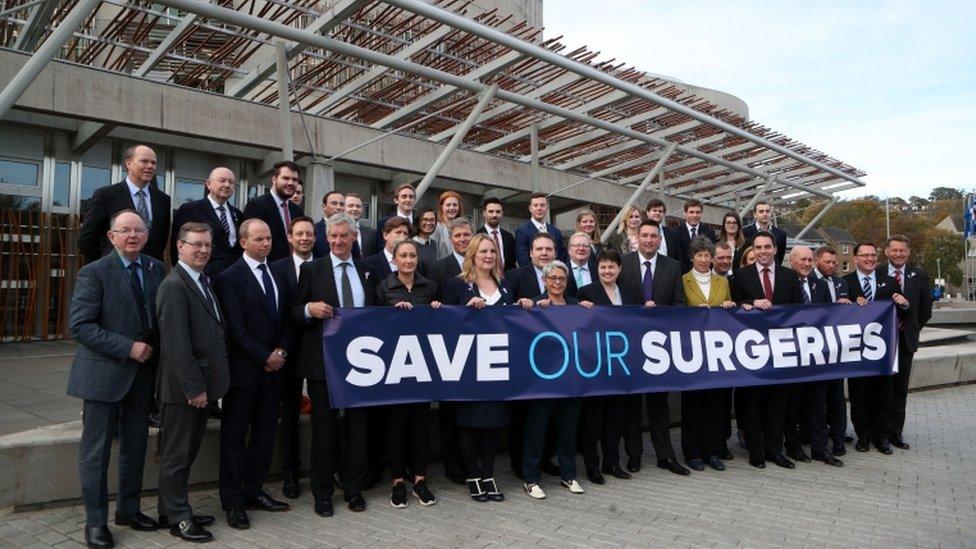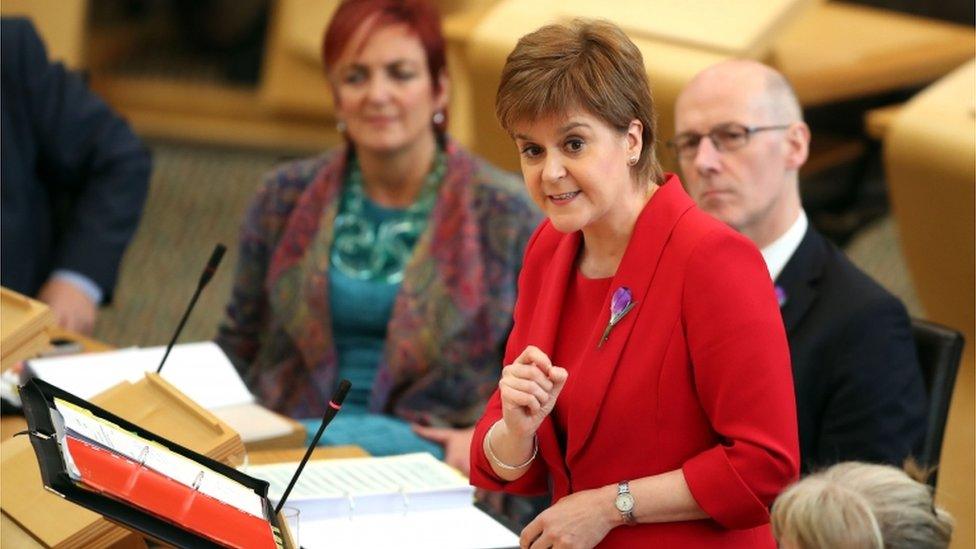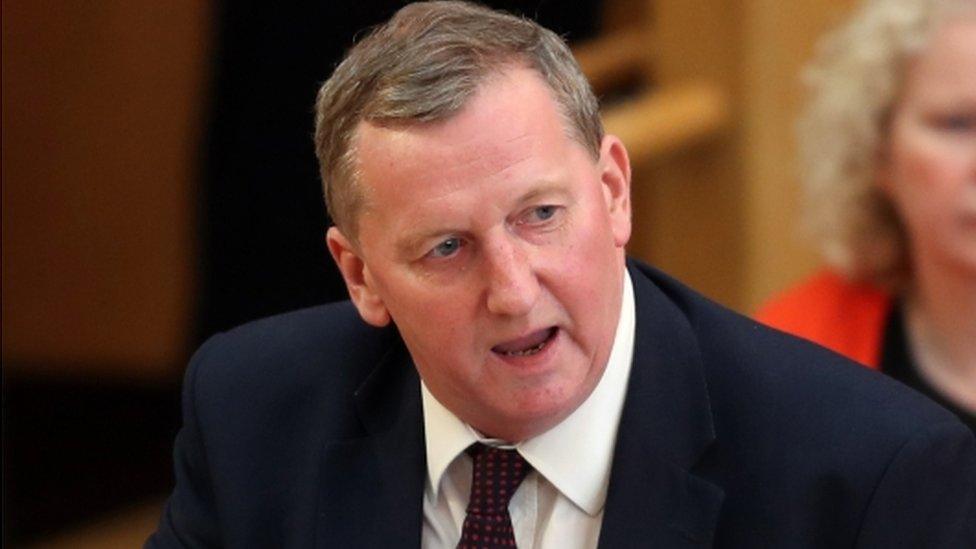Self-conscious Tory protesters
- Published

Revolutionary, it was not. Nary a line from La Marseillaise. At no point did the demonstrators break into Bandiera Rossa or even Azzura.
But there was serious political intent behind the Conservative demo at Holyrood. All the MSPs stood behind the banner complaining about cuts to GP surgeries.
They even mounted a hesitant chant of "Save our Surgeries", the gentlemen shooting their immaculate cuffs and adjusting their tie-pins before joining in, encouraged by Miles Briggs' passable baritone indignation.
Admittedly, they then all giggled just a little, as if aware of the incongruity involved. Jackson Carlaw seemed notably self-conscious.
Dual strategy
But, to repeat, they mean business. The Conservatives are the largest opposition party at Holyrood. Their leader Ruth Davidson has disavowed all suggestions that she is headed for Westminster, stressing that she intends as a very minimum having a good go at securing the office of first minister next time out.
To do so, the Tories have a dual strategy. Firstly, they depict themselves as the most consistent and dependable defenders of the Union, downplaying rival claims.
But they know, they know, that will not be enough. It might corral the pro-Union vote, or at least a substantial proportion of it. To win, though, they need more. Hence part two of the strategy.
Which is to condemn the SNP over the "day job" - education, the economy and, today, health. While suggesting, over the passage of time, that the Tories could do rather better.

And so Ruth Davidson piled in today over the Audit Scotland report which suggested that there were continuing challenges in the stewardship of the NHS.
As did Labour's Alex Rowley who extended the attack rather neatly - in a style he has made his own - by referring directly to the popular impact of health service problems.
Both interrogators, however, found a first minister in fine form. Nicola Sturgeon was combative and confrontational, while simultaneously acknowledging - she could do no other - that there were difficulties ahead in NHS provision.
Ageing population
Her opening gambit was to attack the Conservative UK government. When Ruth Davidson said that the Scottish government had missed seven out of eight NHS targets, Ms Sturgeon noted that Team Theresa had achieved a full house. All eight missed.
The Tories protested (it was a day for demonstrable disquiet) that the FM should stick to Scotland. But Ms Sturgeon was undeterred. Her wider point was that problems in health service provision were not confined to Caledonia but were common across the developed world, with an ageing population.
Then she drew loud applause from her colleagues - John Swinney clapping with notable enthusiasm - as she chided her opponents for failing to produce any alternatives. Indeed, she said they had sought to thwart avenues for reform.

Alex Rowley also attacked Ms Sturgeon over his government's record on the NHS
To be clear, both Ms Davidson and Mr Rowley pursued their points with vigour and aplomb. They quoted at length and in depth from the Audit Scotland report which was the source of the controversy.
But, on the day, Ms Sturgeon was ready for them. As she was for Patrick Harvie of the Greens and Willie Rennie of the Liberal Democrats.
Mr Harvie deftly turned a question about Audit Scotland into cross-party budget negotiations.
He said NHS staff deserved better pay, a real terms increase. He said that could only be funded by taxation. And he then produced from his back pocket a Green plan for tax reform which will form the basis of pending talks with the Finance Secretary Derek Mackay.
But Ms Sturgeon declined to negotiate in open chamber. On pay, she said that the SG had lifted the 1% pay cap but would aim for an "affordable" settlement.
Range of options
On tax, she said that Mr Mackay would produce his budget plans in December but would, as an opener, publish a document next week which will feature a range of options, including tax plans culled from published opposition ideas.
However, she hinted once more that the time may now be arriving when Holyrood's tax plans have to be used with greater vigour. Stand by, as I have reported previously, for alterations to the tax bands in Scotland in order to raise more cash from top but also from middle earners.
As for Mr Rennie, he raised the issue of college places which has dogged Ministers at sundry points over a prolonged period.
Was there now a U-turn, he said, on the policy of a bias against part-time places in Scotland's colleges? The FM was plainly ready for the question - but was, equally clearly, disinclined to use Mr Rennie's language.
So she talked of an earlier policy - a predilection for full-time courses - which was designed to address a particular spike in youth unemployment. With, she argued, evident success.
However, part-time places had also continued in operation and would do so. All clear? Mr Rennie was less than impressed and said so.
Ms Sturgeon, who was having a good day, seemed capable of coping with Mr Rennie's discontent.